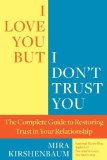
The Complete Guide to Restoring Trust in Your Relationship
Review posted April 17, 2013.
Berkley Books, New York, 2012. 294 pages.
I hesitated before reviewing this book. After all, I am not in a relationship any more. But I've posted reviews of so many books to help when a marriage falls apart, I wanted to mention this one, that looks like it would be great help at putting a marriage back together. And if I ever get in a relationship again, I want to remember that it exists!
I began writing Sonderbooks in 2001. At the time, I described myself as very happily married. And I honestly thought I was. Now I'm divorced and I've come to the place where I'm enjoying my life now. But I don't want to cut myself off from people because I don't want to get hurt again. However, a major betrayal leaves scars, and this book shows how to work with them.
There are other books out there that take you through a breach in trust. For example, NOT "Just Friends" takes you through the trauma of an affair. One thing I like about "I Love You But I Don't Trust You" is that the focus is on rebuilding trust. This book gives you hope that trusting again is possible.
Here are some sections from the author's words in the first chapter:
Can love survive betrayal? I believe it can. I've seen it. I've lived it. Hell, if betrayal necessarily kills love, then love is too fragile to exist in the real world. Because the world is made up of imperfect people who make mistakes. Imperfect people -- people we love -- will too often hurt us and disappoint us and betray us, which will set up a chain reaction that too often destroys a relationship.
Well, if we can't stop ourselves from hurting the people we love and being hurt by them, then we have only one choice: We have to find a way to repair the damage that's done when there's been a betrayal....
We need to restore the trust because I firmly believe that while you can't have people without betrayals, if only little ones, you can't have love without trust.
Having trust makes love come alive. Trust isn't just the basis for a relationship; it's the lifeblood that keeps a relationship healthy.
The biggest difference trust makes in any relationship -- and not just an intimate one -- is that you can relax, be open, be yourself. Just think about it: If you can't be yourself because you're not feeling safe, then even if the other person "loves you," he's really just loving a stranger, the person you're projecting who's not really you. And so how can you feel loved if it's not the real you who's being loved? And how can you keep on giving love if you're not feeling loved?
But when you trust each other so that you can be yourself and be open, the roots of love grow very strong. They grow into your very being.
This book will help you evaluate whether to stick with the relationship where you were hurt, it will help you calm your natural crazy-person reactions to betrayal, and it will help you learn to trust again, whether the new trust is with the original person or someone else.
One thing I like about nonfiction books is that without guilt I can quote the end of the book:
The good news is that we can learn from experience.
For some of us, that learning is all about how we can be hurt. And that's too bad. But we can also learn that these hurts can heal. We can learn that there are people out there who are far less likely to hurt us. We can learn about how resilient we are. We can learn that trust makes sense. We can learn how to create the solidly based trust we're so hungry for.
